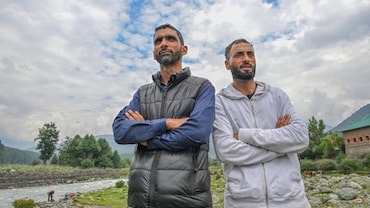- HOME
- /
- True Stories
- /
- Good News
- /
These Green Entrepreneurs Are Showing Us How To Live A Zero-Waste Life
These five heroes have made waste management the centre of their ventures. Here are their amazing stories
 Green entrepreneurs Amita Deshpande, Diti Kotecha, Sahar Mansoor and Poonam Bir Kasturi
Green entrepreneurs Amita Deshpande, Diti Kotecha, Sahar Mansoor and Poonam Bir Kasturi
For most businesses, waste management remains a residual activity—doing just enough to fulfill government regulations. But, these five entrepreneurs show us how trash can be tackled in innovative ways and even be used as building blocks for successful businesses, all the while working towards a greener, more sustainable, future.
Poonam Bir Kasturi, founder, Daily Dump
Fifty-seven year old Poonam Bir Kasturi is a product designer; determined to explore alternatives to combat waste. This led her to design khamba, a terracotta composter which helps homes compost their kitchen waste. “Experts feared that Indians would never keep waste in their homes and the social stigma attached to waste would make this an impossible habit to build,” says Kasturi. She launched Daily Dump in 2006, which is a design-driven home-composting label that is handcrafted by artisans from different small-scale industries.
An NID-graduate, Kasturi in her first year of design school, witnessed life on a landfill site closely and started working on waste. “But it was only after I started teaching and delved deeper into sustainability that I decided to do something real in this space,” she says. “Waste is the last thing on people’s agendas. They would prefer to just have someone take it away and handle it for them. Here, we tell them to take charge. It requires a huge change in mindsets,” says Poonam, who is also a TED India fellow.
 Terracota products from Daily Dump
Terracota products from Daily Dump
Daily Dump has won several awards in the field of environment and development, such as the SEED Low Carbon Award and Swachh Entrepreneurship Award (2018). Last year, Daily Dump was one of the 70 projects that were showcased in a themed exhibition at Victoria and Albert Museum, London.
Amita Deshpande, co-founder, Aarohana EcoSocial Developments
With a revenue amounting to almost half a crore in 2018, thirty-six year old Amita Deshpande’s Aarohana EcoSocial Developments is a master class on how to run a flourishing business without destroying the planet. “It’s like this. If you do chemical farming, you are going to earn, even though you’re ruining the soil. Which is not the case with organic farming. So why not do a business that’s good for both you and the planet?”says the Pune-based businesswoman.
Aarohana EcoSocial Developments’ first unit was launched in Dadra Nagar Haveli, where they have employed the local tribal population to make the handwoven, upcycled products. Currently, they’re crowdfunding for their second unit that is coming up near Kamshet, Pune.
But, is it easy to deal with trash? “After buying the waste from the waste-picking NGOs, we wash and sanitize the plastic bags, that includes chips packets and gift wrappers too. Then, we sort them out by colours and cut them with scissors. With the help of the handloom charkha, we then start the weaving process,” says Amita, who started the upcycling initiative five years ago with her close friend, Nandan Bhat.
 Products from Aarohana EcoSocial Developments
Products from Aarohana EcoSocial Developments
Talking about India’s environmental initiatives, she says the solutions are not enough. “It’s high time our government starts to subsidize R&D to explore solutions. It’ll be a revolution in itself,” says Amita, whose brand has upcycled more than one lakh discarded plastic bags till now.
Meenakshi Sharma, founder, Use Me
Meet 31-year-old, Delhi-based, Meenakshi Sharma, whose eco-label Use Me makes sustainable and handmade creations from textile waste. “I have always loved working with hands and upcycling. It was during my internship that I noticed the huge amount of wastage that occurs in production. This made me think of having a sustainable model for my work,” says Meenakshi.
Soon, Meenakshi decided to explore areas where women wanted to work to run their families. “That got me to Andheria Modh, where resides a marginalized community, since there was no other source of employment here and women did not go out. In 2017, I opened my studio right at their locality and build up a team with these ladies. They have been my biggest support system and we are trying to change this lane into an upcycling hub,” she says.
 Meenakshi Sharma with products from Use Me
Meenakshi Sharma with products from Use Me
On an average, the team of 30 upcycles about 200-300 kilos of textile waste every month. Meenakshi’s label offers eco-friendly alternatives to green enthusiasts. She and her team have made eco-friendly items for various projects, ranging from a 40-feet Christmas tree made out of waste to hundreds of lanyards for an event. What encourages her to move ahead? “The fact that we are short on time,” says Meenakshi.
Diti Kotecha, founder, Théla
Four years ago, when she moved to Greece, is when graphic designer Diti Kotecha took to sustainable living. “Here in Europe, single-use plastic consumption is ‘normal’and more challenging to avoid. May be that made me more sensitive to its impact and inspired me to do something about it,” says Diti.
As a child growing up in Mumbai, Diti hardly came across any single-use disposable products like toilet paper, nappies and kitchen rolls. “There were no fast food and take-away restaurants and no supermarket chains, we grew up with a lot less plastic,” says Diti.
This motivated her towards a minimal lifestyle and even a vegan diet. It was in 2017, however, that she started working with waste/discarded plastic bags using techniques like hand- and machine-sewing, crocheting and weaving. “Théla is a plastic upcycling initiative that hand-crafts products with discarded plastic bags, thus diverting plastic waste from filling landfills, polluting oceans and harming wildlife,” describes Diti. After washing and drying the plastic bags, Diti cuts them and makes them into yarn-like balls and finally crochets them into colourful lifestyle pieces. She also works with local craft institutions like Khamir, which is a Kutch-based crafts brand, to help her with the process of turning plastic bags into yarnand more. Her creative work is an embodiment of living life responsibly, one of her life’s main goals.
 Bags from Théla
Bags from Théla
Currently, the 39-year-old is in Mumbai, India, working on two new product ranges, handbags and waste pouches. Apart from Khamir, she’s working with a cotton canvas shop that sources cotton from the south of India, who are helping her with new range. “Never did I feel I could run a sustainable business and now, here I am, in a new country, running an upcycling initiative!”
Sahar Mansoor, founder, Bare Necessities
Sahar Mansoor was in her third year of college, when a video of Bea Johnson (a French woman, whose entire family leads a zero-waste life) in one of her classes got her thinking about a zero-waste life. After two years, Lauren Singer, a New York-based entrepreneur, inspired her to take the plunge and start her own waste-free journey. “I wanted to stop being a part of the problem and address my own trash problem first,” she says.
While Sahar was introduced to a zero-waste life in the US, it was her grandmother who told her about this being an old practice here in India (read steel tiffin boxes and herbal tooth powders). She started experimenting with making soaps in her mum’s kitchen and there was no looking back. Sahar launched Bare Necessities in 2016, which makes zero-waste products like bath salts, soaps, laundry detergent, toothpaste and steel straws.
It took Sahar some six to eight months to turn into a low-waste person. A typical day in her life involves using her zero-waste dental kit, carrying her own stuff to work that includes a steel bottle, lunch box, handkerchief, bamboo cutlery, stainless steel straw—these help her consume no single-use plastic items like plastic disposable boxes and spoons. “Bare Necessities is my attempt of documenting my journey and through that process, break myths about going zero-waste to be difficult, complicated, time-consuming and not-fun!”
 Bodycare products from Bare Necessities
Bodycare products from Bare Necessities
Recently, Sahar launched a short online course for those who want to switch to a zero-waste lifestyle. “I’m constantly looking to help create more online content and build a community through our webinars, podcasts and more,” she says. She also works with students and individuals to encourage the community explore natural alternatives. For instance, she collaborated with a group of university students who want to help local street vendors to shift from plastic straws to a straw made of coconut leaves (hence the project name: the Last Straw campaign). “We are constantly working to make it convenient for people to reduce their waste,” says the Bengaluru-based entrepreneur.






